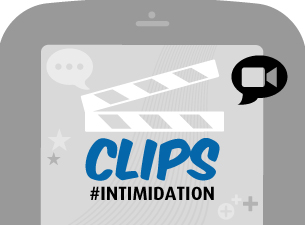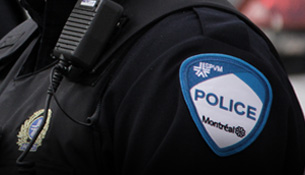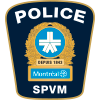
Bullying
There are two types of bullying:
- Direct bullying: the victim is verbally or physically attacked (pushed, hit, threatened, confined in a locker, etc.)
- Indirect bullying: the victim is ignored, ostracized or rejected by the group. Sometimes this behaviour is carried out in secret (spreading false rumours, maligning, mocking, etc.)
Intimidation for extortion is robbery. The aggressor may use force or threats. These intimidators may work alone or in a group, by intimidating their victims, often younger teens or children, for example. Children are robbed of their money, lunch, clothes or other items.
+ See also : Cyberbullying
+ See also : Harassment
I am being bullied
Advice
- Ignore the person who is intimidating you
- Stay away from them
- Do not respond when they provoke you
- Tell someone you can trust
- Avoid being alone
- Take note of the date and time of the intimidating behaviour
- Clearly state that you wish to be left alone
- Report the situation to the police or to other professionals
You do not have to follow all of this advice before going to the police. If you feel the situation warrants it, you can contact the police sooner.
Often police intervention is combined with assistance from other responders to stop the intimidation. Police Officers can direct you to the specialized resources you may need.
My child is being bullied
- Never take it lightly if your child complains about being bullied.
- Ask your child to describe what is happening.
- Encourage your child to report the aggressor.
- Assure you child that you will help.
- If you have to, inform the school about the situation.
- School behaviour codes generally have zero tolerance for bullying and intimidation for extortion. There may be consequences for the aggressor. It is important for your child to know that you are there to provide support and that you will not tolerate this kind of treatment.
- Reinforce your child’s self-esteem by helping him or her to develop strengths and talents.
- Never encourage your child to defend him or herself by hitting back. This just teaches a type of violence that is likely to increase the aggression and rejection the child is already experiencing.
- Enrol your child in activities that can help him or her develop a better body image.
- Encourage your child to make new friends by enrolling him or her in extracurricular or activities or hobbies.
- Avoid overprotecting the child and trying to solve the problems in his or her place.
Source: Ordre des psychologues du Québec
Teens
If your teen has encountered any form of violence, (bullying, assault, threats, etc.), don’t ignore it. If he or she talks to you about being a victim, listen carefully. Speak up about it, lodge a complaint with the police and notify school authorities, if necessary. You can also provide information anonymously by calling Info-Crime Montréal at 514 393-1133.
When young people are exposed to intimidation and coercion—by gangs or others—there is an increased risk that they will adopt aggressive or criminal behaviour to protect themselves. As a result, they are vulnerable to being drawn into a gang lifestyle, which in turn, can lead to delinquency and crime.
My child is bullying others
Is your child showing signs of delinquent behaviour? Remember that as a parent you can do something to help. Establish clear rules at home and stick to them. Know who your child’s friends are. Find out what they do and where they go. Work with teachers and the school administration to keep tabs on your child’s performance.
Communication is vital. Find ways to show how important your child is to you. If disciplinary measures become necessary, focus on the inappropriate behaviour, not on personality. For most teens, committing delinquent acts is only a temporary phase they go through in their attempt to establish their own identity. If they get the support they need, they will eventually come around and once again behave in a way that shows respect for others.
Remember, you’re not alone! Many organizations offer free resources to parents dealing with their youngsters’ problematic behaviour. Break the silence and take advantage of the services to talk about what you’re experiencing and get help.
10 main reasons kids bully others
- Someone – perhaps a parent or brother or sister – is bullying them
- Someone bigger and stronger is pressuring the child to be “tougher”
- They think the world revolves around them
- They need attention
- They have problems at home
- They have no real friend and they feel lonely
- They don’t feel good about themselves and they want others to feel bad too
- They feel bullied, and bullying others gives them a sense of power
- They want their classmates to think they’re strong and in control
- They don’t think about other people’s feelings or could care less
Useful resources
The following organizations can provide you with information and support:
Information and Referral Centre of Greater Montréal
- Free service providing information about and referrals to community resources available in Greater Montréal.
- Tel.: 514-527-1375
- Routine, preventive and therapeutic health care and social services (nurses, social workers, psychologists, special educators, etc.).
- Tel.: 514-286-5615
-
Ministère de l’Éducation, du Loisir et du Sport (MELS) website, to deal with violence and bullying at school.
Éducaloi
-
Informative website about the law and the rights and responsabilities of all
-
The law, your rights - Parents
-
Promoting Relationships and Eliminating Violence Network : a national network of leading researchers and organizations, working together to prevent and stop bullying in Canada and provide information on the subject.
-
Website assisting young victims of cyberbullying by people posting a picture or a video of sexual connotation. Explanations on Internet pictures and messages removal.
- 1-800-668-6868
- Help line to support and counsel youth.
- Tél. : 1-800-263-2266
Tel-jeunes - parents phone line
- Free, confidential and professional help line for parents, a complementary service to Tel-jeunes. Available 24 hours a day, 7 days a week.
- Tel.: 514-288-5555
Parents en marge de la rue
- Support for parents whose children are involved in street-life related situations (running away, prostitution, etc.).
- Tel.: 514-849-5632
Ligne Parents (in french only)
-
Ligne Parents web site. They offer professional intervention service that is free and confidential to all parents of kids ranging from 0 to 20 years of age.
-
Tél.: 1-800-361-5085
-
Royal Canadian Mounted Police website on Internet security, and on bullying and cyberbullying
- Filing and processing of reports. Assessment and referral services. 24 hours a day, 7 days a week.
- Tel.: 514 896-3100
Health and social services centres (CSSS)
- Site of the Health and social services centres of Québec, where people can go to receive services or referrals in case of health and/or psychosocial problems.
- Tél.: 8-1-1
Crime Victims Assistance Center (CAVAC)
-
Assistance centres for victims of crime’s website. To help you overcome the physical, mental and social consequences of crime. The professional services they provide are confidential
and free of charge.
-
Tél.: 1-866-552-2822
Batshaw Youth and Family Centres
- Filing and processing of reports. Assessment and referral services. 24 hours a day, 7 days a week.
- Tel.: 514 935-6196
Community relations officer at your PDQ
- Tips, tools and referrals addressing youth-related issues and resources.
- Tel.: 514 280-04XX (The last two digits are the number of your neighbourhood police station). Example: PDQ 24 = 514 280-0424
Bullying - What is it?
This video clip helps you understand bullying in the school environment. Bullying is much more serious than schoolyard bickering. This first video clip explains the 3 criteria for identifying a bullying situation.
Bullying - is my child a witness?
Being a witness is no small matter. This second video clip makes you aware of the importance of discussing the problem of bullying with your child. It also gives you the tools to help them to respond properly if your child witnesses any bullying behaviour.
Bullying - is my child a victim?
This third video clip helps you answer the question: Is my child a victim of bullying? You will also find advice and referrals so you can help your child put an end to the bullying situation.
Bullying - is my child an aggressor?
The purpose of this video clip is to answer the following question: Is my child a bully? You will also find advice and referrals so you can help your child stop this behaviour.



